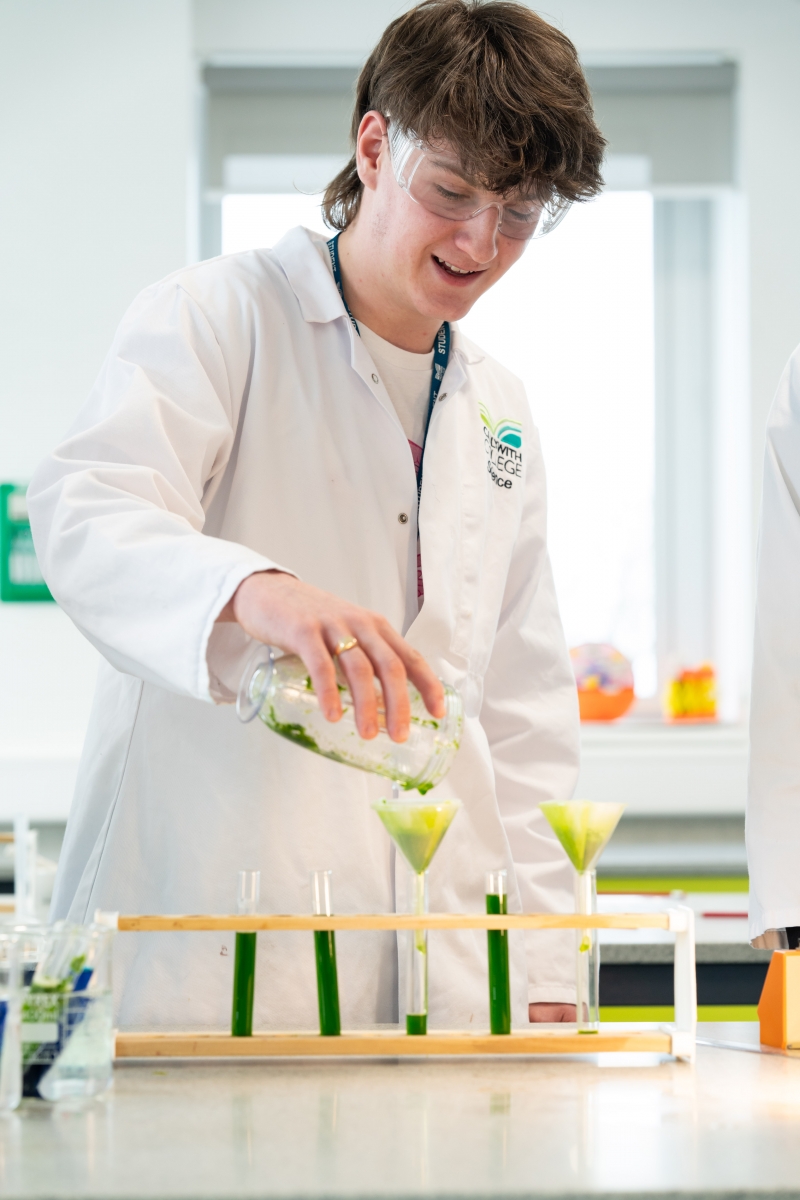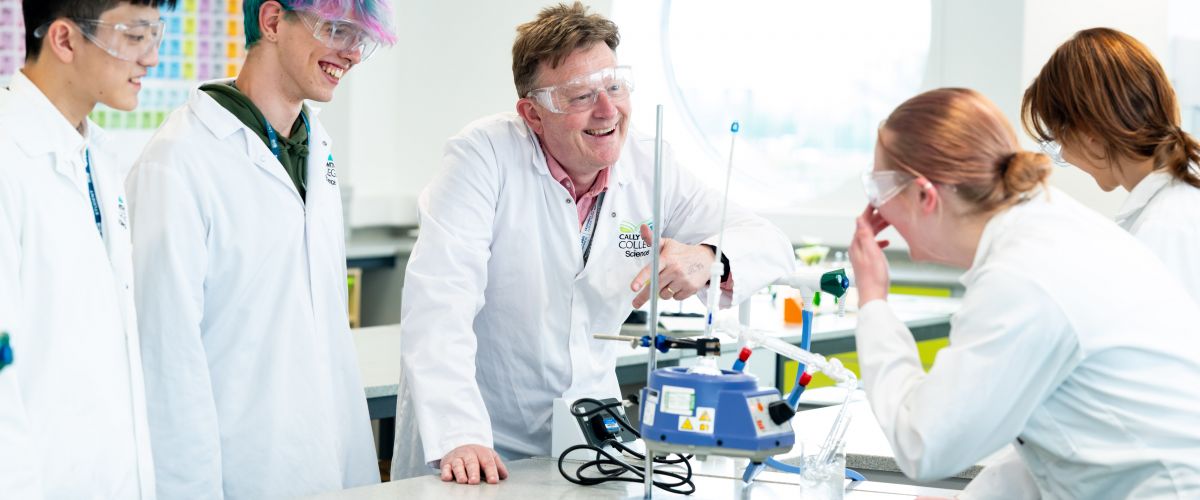BTEC Level 3 National Extended Diploma in Applied Science
Scientists use the same skills on a daily basis to attempt to solve current issues. This course is designed to give you a detailed understanding of aspects of science with an emphasis on the skills and knowledge used in the fields of forensic and biomedical sciences.
Key information
Science / Full Time / Level 3 Extended Diploma

Why choose this course?
Over the two years of study you will develop the scientific knowledge, practical and problem solving skills to enable you to progress into employment or onto a range of Higher Education courses. You will study a range of core scientific units and specialist units with a particular emphasis on the knowledge, skills and techniques used in the vast fields of science. Throughout the course you will develop your scientific understanding and practical skills through a series of assignments and challenging investigations which utilise some of the techniques used by scientists in the workplace.
During your course you will complete a project on an area of science where you have to plan an investigation and conduct an experiment you have designed, with development of your skills such as evaluation, analysis and synthesis.
The first year will enhance your understanding of the key chemical and biological topics. You will relate your practical science activities to the relevant theory and develop your skills in laboratory experimentation, analysis of results and evaluation of methods, key skills for any working scientist. You will build a portfolio of practical techniques and use your knowledge and understanding to complete a series of assignments on which you will be assessed.
What will I learn?
The course aims to give you a varied learning experience and will be a combination of a student-centred approach to learning, involving research for assignments, visits, guest speakers, lectures, group work and discussions.
An experienced team of lecturers, many of whom have worked in scientific industries will support your learning. You will need to be prepared to work hard independently, carry out in-depth research and use a variety of information sources. You will study a range of core and specialist units over the two years of the course. The specialist units have been carefully selected to keep your options for further study as broad as possible whilst giving you specialist knowledge of key areas.
Year 1: The emphasis of year 1 is to provide you with the knowledge and skills to be able to apply what you learn to analytical science situations. You will study core and specialist units covering some of the following themes: Principles and Applications of Science 1, Practical Scientific Procedures and Techniques, Scientific Investigative Skills, Laboratory Techniques and their Application, Biological Molecules and Metabolic pathways and Microbiology and Microbiological techniques.
Year 2: Year 2 will enable you to see how science is used in a variety of industrial contexts and to relate your broad studies in year 1 to some specific areas of science. Again, you will study a mixture of core and specialist units covering some of the following themes: Investigative Project, Principles and Applications of Science 2, Genetics and Genetic Engineering, Contemporary Issues in Science, Human Regulation and Reproduction, Applications of Organic Chemistry and Practical Chemical Analysis.
Assessment Arrangements
Your achievement in this subject is dependent upon excellent attendance, punctuality and effort. You will learn in a friendly atmosphere, using a variety of assessment methods. Assessment is by a combination of assignments and controlled assessments. Assignments are internally set by the team and externally moderated by Pearson (Edexcel).
There will be an examination for two units each year and a controlled assessment, which are externally set and marked. Making up approximately 30% of final grade. Assignments are graded at pass, merit and distinction level and may take any of the following formats: written practical reports, portfolios of work, presentations, written research assignments and individual practical investigations There is a strong emphasis on the acquisition of skills that will prepare you to study at university, for an apprenticeship or enter employment. The grades awarded are given points and are converted into a final grade at the end of the course which will range from a Pass, Pass, Pass (PPP) to Distinction*, Distinction*, Distinction* (D*D*D*).
This grade will be converted into UCAS points at the end of the course. Typical university offers require final grades of Distinction, Merit, Merit (DMM) and above.
Information & Support
We encourage all students to read widely and conduct their own research into the topics they are studying. You will be expected to undertake at least 12 hours of independent study time per week. There is a wide range of support material available in the Learning Resource Centres and on the course OneNote site. Throughout the year, you will be able to access additional support and opportunities to stretch and challenge you.
Where will it take me?
Scientific skills are always in demand in the workplace and a wide range of careers are possible including hospital and research laboratories, school or college laboratories or quality control laboratories (for example in the food and drink industry) analytical laboratory work, forensic laboratory work, and scenes of crime work. The course can also lead to a variety of science-based courses at Higher Education including Chemical and Biological Sciences, Criminology and Forensic Science, Biomedical Science, Radiography, Food and Nutrition and Nursing.
What will I need?
You will need four GCSEs at grade 4 including a 44 in Combined Science or 4 in each individual science.
Whilst it is possible to re-take GCSE English and Maths at Callywith College, students can only study one of these subjects alongside our Level 3 courses and therefore all students must have at least one grade 4 in English or Maths at the point of enrolment (other course specific entry requirements apply).
Additional Information
Awarding Body:
Pearson (Edexcel)
To obtain more information about this course, please call: 01208 224000 or email enquiry@callywith.ac.uk

